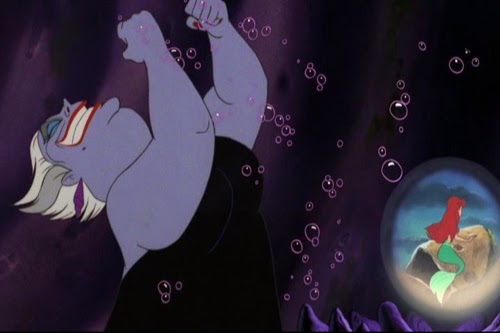About a month ago, I auditioned for Mosaic Theater Company's The Little Mermaid, and I got the roll of Arista, one of Ariel's sisters. (Note: Do not underestimate the power of the Broadway mersisters, as in the Broadway musical they have a much more key roll than in the Disney movie.) So, I think I did pretty good for my first real audition. I was reading though my script a few minutes ago, and since I adore the character Ursula (and her song, "Poor Unfortunate Souls"), I was studying her lines very closely. When Ursula is putting the spell on Ariel to turn her into a human, she says this: "Beluga, Sevruga, come winds of the Caspian Sea! Larynxes, glacydis, admax laryngitis la voce to me!" Upon reading this, I was very curious as to what it meant. For one thing, there was a period of time when I was extremely obsessed with the ocean, and my favorite animal was by far the Beluga Whale. After my research, I could gather that the first part of the chant was completely centered on the ocean. Which is why Ursula mention the Beluga whale, and also the Sevruga, which upon study I found out was "a migratory sturgeon found only in the basins of the Caspian Black Seas, much fished for its caviar." (As quoted from the Google dictionary.) "Come winds of the Caspian Sea!" is what she says after the part about fish, and I found this interesting, because to my knowledge, the play is set in the Caribbean, although there are many references to the Caspian Sea.
 The second part, however, needed more explaining. This part is more centered on becoming human, and losing your voice. The word "larynxes" is an English word, however it does have latin roots, and basically just means the upper part of the trachea. The second thing she says in the second part of the chant, is "glacydis". I had absolutely no idea what that meant, so I looked it up on Google Translate. Apparently Google Translate had no idea either. So I Googled the definition. The only things that came up were clips of Ursula singing "Poor Unfortunate Souls" from the movie. To my knowledge, this is a completely made up word and there is no direct translation, although if you looked until your eyes started to bulge out and bleed, then you might find one. Maybe.
The second part, however, needed more explaining. This part is more centered on becoming human, and losing your voice. The word "larynxes" is an English word, however it does have latin roots, and basically just means the upper part of the trachea. The second thing she says in the second part of the chant, is "glacydis". I had absolutely no idea what that meant, so I looked it up on Google Translate. Apparently Google Translate had no idea either. So I Googled the definition. The only things that came up were clips of Ursula singing "Poor Unfortunate Souls" from the movie. To my knowledge, this is a completely made up word and there is no direct translation, although if you looked until your eyes started to bulge out and bleed, then you might find one. Maybe.Anyway, the last thing that this horrid sea witch talks about is "admax laryngitis" and "la voce to me!" Admax laryngitis is a mix of latin and english - "ad" is something to the note of "of" and max is the latin term for "maximum", and as you probably know, laryngitis is when your larynx gets inflamed, and it affects your ability to sing, harsh breathing, and a painful cough. So basically she was just saying that Ariel should get maximum laryngitis. Harsh stuff. "La voce", I found out, is Catalan, and a rough translation is "softness of voice."
To summarize, she's really just cursing Ariel to be quiet forever with a bunch of different diseases, and telling the ocean to perform dark magic on her. Thanks for reading!
-Lisi
Sources: translate.google.com, dictionary.reverso.net, google.com, and my sister knowing a lot about Latin words.
"Glacydis" sounds like "glossitis," which is the medical term for an inflamed tongue. That may have been what the lyricist intended.
ReplyDeleteHmm, that's an interesting thought. It does seem likely, due to the nature and subject matter of the chant.
DeleteThanks for reading, we know we don't post very often but we'll try to keep on posting more interesting things. Keep commenting and reading and we;ll try to add as much new content as we can. :)
Glacitis means froze
DeleteIt's "glossitis, et max laryngitis la voce to me" et is Latin for and. Max is short for maximum. La voce is either Latin or Italian for voice
ReplyDelete"La voce" is italian. First in latin you don't have article, and the word voice is vox (declination: vox, vocis, voci, vocem, vox, voce). The voice to me in latin should be "vocem mihi". So I guess the last sentece is just a mix of italian and english.
DeleteShe doesn't mean the beluga whale. She means https://en.wikipedia.org/wiki/Beluga_(sturgeon) -- a fish from the Caspian sea.
ReplyDeleteI have no idea why she is so much concentrated on the distant sea and its fauna.
Or she could mean beluga sturgeon. Since she's chanting beluga servuga and servuga is a sturgeon she could mean the beluga sturgeon as well
DeleteNice article. Age's well
ReplyDeleteI had the words of her spell pop in to my head randomly today and did some Googling to find their meaning. Very interesting read!
ReplyDelete